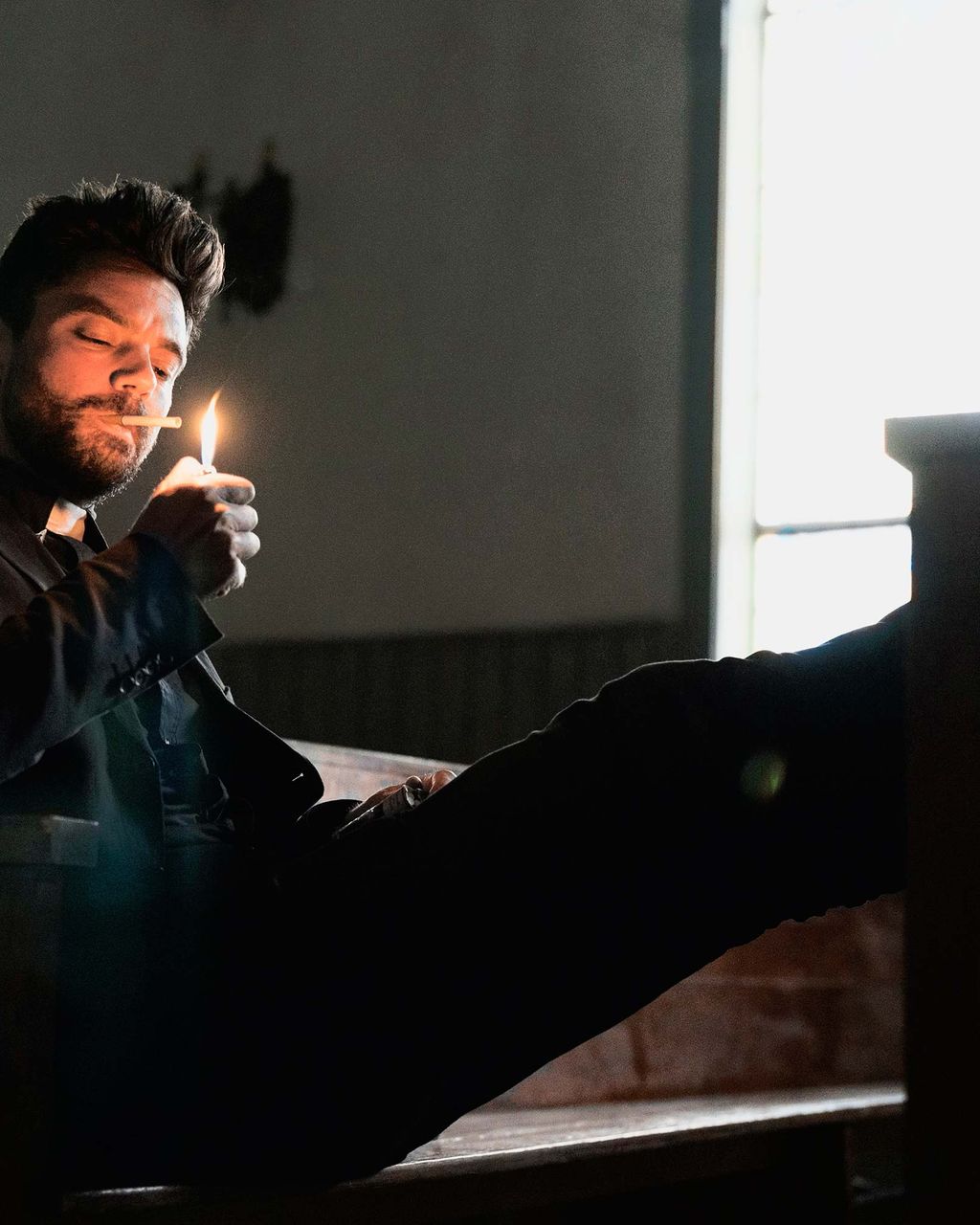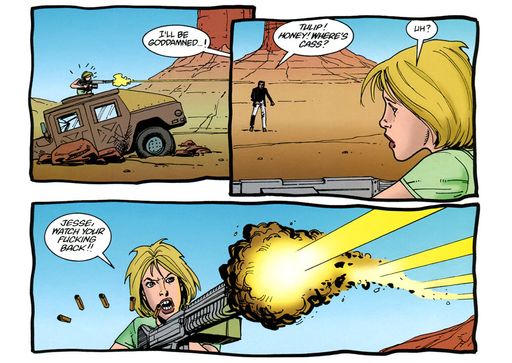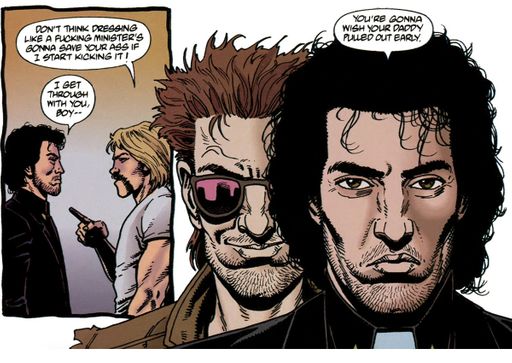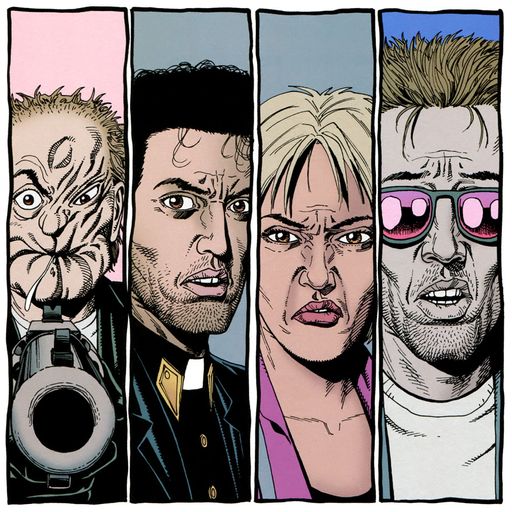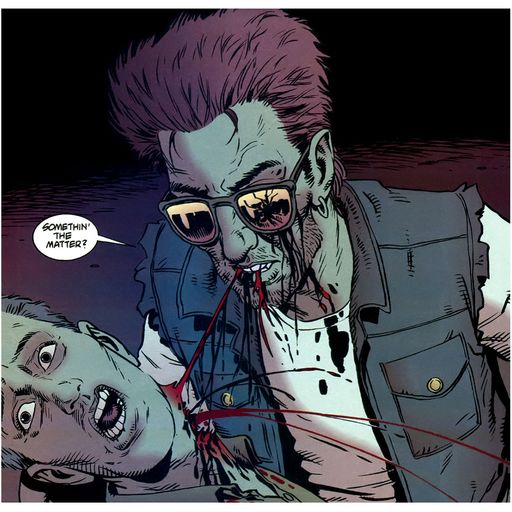In October 2013, zhlubby moguls Seth Rogen and Evan Goldberg asked Breaking Bad writer and producer Sam Catlin to work with them as showrunner on a televised adaptation of the cult-hit comic-book series Preacher. They gave him a copy of the source material — 66 issues, published by DC Comics imprint Vertigobetween 1995 and 2000 — which Catlin quickly devoured. Then he had to scratch his head a little bit. “I couldn’t believe how profane and perverse and psychotic the whole thing was,” Catlin says with a bit of wonder in his voice. “It was brought to me as a potential television show — I couldn’t figure out how that was gonna happen.”
He’s not being hyperbolic. Written by Garth Ennis and penciled by Steve Dillon, Preacher featured inbred descendants of Jesus, a nuclear strike on Monument Valley, and a man screwing a giant pile of meat. The story follows the adventures of a Texas reverend and child-abuse survivor named Jesse Custer after a supernatural entity grants him strange powers. He subsequently goes on a global road trip alongside his hit-man girlfriend, Tulip, and a louche Irish vampire named Cassidy. Their mission: Find God, who has abandoned His heavenly throne, and tell Him what an asshole He is. The thrilling, riotous series was a kind of over-the-top adolescent fantasia of male swagger — which also dipped into some unlikely-seeming (as far as adolescent fantasias go) emotional territory, with nuanced meditations on trauma, toxic masculinity, and the challenges of friendship
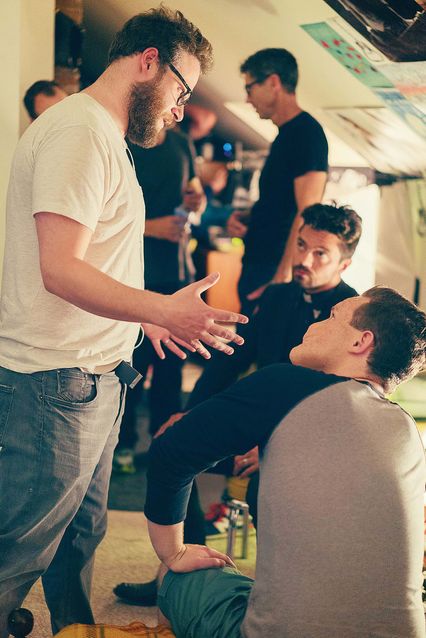
But what made Preacher viscerally cool to marginalized, beta-male ’90s teens like Rogen and Goldberg was the macho intensity of its narrative — the pleasure it took in breaking boundaries almost for the sake of breaking boundaries. If superhero comics fulfill, in their readers, a libidinal urge to become powerful, Preacher went even further by fulfilling virtually every other libidinal urge, too — stimulating fantasies of sex, crime, and revenge, delivering off-color humor (“Your excuses are not worth a foreskin full of stale brie, Bob,” intones a depraved orgy organizer at one point), guns, punching, explosions, and a kind of fuck-you patriotism. It wasn’t bigoted, exactly, but it did push the envelope by regularly featuring characters (usually bad guys, but not always) using the N-word and calling people faggots. There’s lampooning of radical feminists and a questionable origin story for the female lead. There were four vivid depictions of castration (by gunshot, gardening shears, chemical inducement, and a particularly vicious dog). It had a prim lawyer with a secret life as a Nazi fetishist who at one point tells the protagonist to “fuck me hard and call me Eva!” Readers met a man who had gone to the desert and spent years of his life writing FUCK YOU in letters big enough to be seen from space. By the saga’s end, both God and Satan had been brutally murdered.
So you can understand why a lot of tweenage boys went nuts for Preacher in the ’90s. But also why even a passion-project adaptation might be a dicey proposition in 2016 — especially for conscientious and un-macho directors like Rogen and Goldberg. A core component of the geek-culture boom that has put comics at the center of pop culture has been the roller-coaster excitement of bringing over-the-top source material to life: robot-suited crime-fighters, dystopian teenage battle royales, people talking to dragons in made-up languages. For a lot of those stories, the pressure is always to do more in adaptation — to be louder, faster, smashier. Adding narrative steroids has become an audience-growth strategy. But when your material is an id-driven, politically incorrect, take-no-prisoners rager — well, the climate around that stuff is a bit different these days. So Rogen, Goldberg, and Catlin’s approach is a risky one: They’ve rethought the story from the ground up in what is less an adaptation than a total reimagining. The result is a show that eschews a surprising amount of its source material in an effort to make a well-paced tale that’s true to the original’s outlaw spirit while also figuring out what you could do in the Tarantino-infused, p.c.-backlashing late ’90s but simply can’t do now. It’s two fanboys trying to sort out just how much of the Preacher id can be preserved — and how much needs to be dropped to make it watchable today.
***
One thing you can do these days is get a studio to put geeky shit onscreen. “If you’d told me when I was a kid, ‘All you’re gonna read about is Star Wars movies and Marvel movies,’ I would’ve been like, ‘That’s fucking fantastic!’ ” says Rogen in his trademark raspy bellow, still a little amazed at how nerdy Hollywood has become. When he and Goldberg were growing up in Vancouver, mainstream entertainment wasn’t really catering to their tastes (that being the era of teen soaps and Titanic). They preferred what was then a marginalized and financially flailing medium: “We weren’t cool,” he says. “So we read a lot of comic books.”
Twenty years later, the American comic book has become one of the world’s most lucrative sources of intellectual property. “This has happened a lot, where some producer will come up to me and say, ‘Hey, have you read this? I’m trying to make it!’ And I’m like, ‘Yeah, I read this 15 years ago when it came out, and I read every single one of them,’ ” Rogen says with a cackle.
Preacher was one series that particularly blew their minds. As is often the case with outré bits of culture, it came to Rogen and Goldberg’s attention courtesy of a magnanimous older sibling. “I remember Evan’s brother had read Preacher, and then Evan gave it to me to read when we were in high school,” Rogen recalls. “I loved that it contained everything. It was funny, it was dramatic, it had a lot of action and violence, it was horrific at times, perverted at times, very real at times.” He gets particularly wistful while remembering a disfigured character named Arseface and the aforementioned castration-by-dog.
Even as he climbed the rungs of American comedy with roles in Freaks and Geeks and The 40-Year-Old Virgin, Rogen remained obsessed with the comic, which seemed so much more ambitious than TV’s early-aughts offerings. “When I started, Who Wants to Be a Millionaire was on five nights a week,” he says by way of explanation. After selling the screenplay for Superbad, a movie about the pains and pleasures of slacker teens like themselves, he and Goldberg tried unsuccessfully to pitch studios a Preacher adaptation, though, as Rogen puts it, the failure “wasn’t for lack of constantly mentioning it.”
While execs passed on Preacher, the pair were handed another comic-book property, the classic superhero serial The Green Hornet, which turned out to be a financial and critical disappointment when it came out in 2011 — something Rogen partially blames on his and Goldberg’s efforts to please superfans like themselves. “There were a lot of things we included for no reason,” he says. “It was done to satisfy this very specific, niche base of fans. We probably included lots of things that underserved the movie.”
It’s an interesting lesson for a couple of fanboys to learn—that purity can be an enemy when you’re trying to get something made or seen. By the time Rogen and Goldberg were brought in to do script consulting for 2012’s adaptation of the ’80s TV show 21 Jump Street — which followed adult cops masquerading as teens — they were evangelists for the notion of sticking to core principles and throwing away all the other stuff. “We said, ‘We’re trying to make a good movie here with a general idea of “Older people are in high school,” ’ ” Rogen says. “ ‘That’s all people really like about 21 Jump Street, so that’s all we really need to include.’ ”
The lesson probably goes double for an adaptation like Preacher — not only a niche property to begin with but one with a lot of genuinely offensive bells and whistles that would surely turn many, many people off. So when AMC tapped Rogen and Goldberg to develop a Preacher series with Catlin as showrunner in 2013, they decided to showcase the original comic’s core trio of characters and Jesse’s mystic power — and play loose with everything else, particularly the entire plot. Sure, you still have Jesse (Dominic Cooper) merging with that mystical force, but instead of heading out on a wild odyssey, he sticks around in his sleepy Texas town of Annville and ministers to the faithful with renewed vigor. That’s in part a product of the budget constraints of TV — it costs a ton to shoot in a bunch of locations in a single season, and mainstream viewers simply aren’t as used to high-concept high jinks as comics addicts (“You needed to be more slowly immersed in the world,” Catlin says, “or it would just feel like a bad acid trip”). But it also allowed for a number of other revisions.
In the comics, Tulip (Ruth Negga) meets Jesse a few years before the action starts in a random bar encounter, falls passionately in love with him, gets abandoned by him when demons from his past show up, and is reunited with him at the story’s beginning. All of that’s gone in the show — they’re childhood friends who shared a life of crime and, while broken up now, are still on decent terms. Catlin says that was all, oddly enough, an attempt to make the character less archaic in terms of gender roles. “There was something in the comic in that dynamic that felt a little submissive,” Catlin says. “That the source of her being upset with him was You left me. We wanted Tulip to stand on her own two feet and have her own agenda independent of Jesse.”
And here’s where the post-’90s cultural updates begin. As Rogen puts it, the comic “swings between being really sexist and really feminist.” On the one hand, Tulip isn’t a wilting flower in the original: She’s lethal with a gun, she’s as foulmouthed as the guys, and she chews out Jesse whenever he acts like she needs his protection. On the other hand, the source of her strength is revealed to be that she was raised by a somewhat sexist father who wanted a boy and encouraged her to be masculine, an origin Rogen says was “not the most enlightened way to arrive at [Tulip’s] story.”
Tulip is also the subject of the show’s biggest visual change: Comics-Tulip is a pale Caucasian; here she’s played by an actress of Ethiopian descent. Rogen’s pretty explicit about the need for an update there. “We were specifically seeking an African-American actress for Tulip,” he says. “We thought it would make the show a lot more representative of the people in America. And the story of a young black woman growing up in West Texas seemed like it added another layer.”
But race is rarely mentioned in the show — a pronounced difference from the comics. There’s a slightly cringe-inducing moment early in the pilot where the mystical force goes to a place that onscreen text merely identifies as “Africa,” but beyond that, there’s not a lot to chew on. By contrast, the first few issues of the Preacher comic feature a horrifically racist (and somewhat insane) Annville sheriff who drops racial slurs left and right and complains about “Martian niggers” in outer space. “Given that I was writing about the South, about an almost caricatured, redneck part of the South, there was no way I was gonna ignore racism,” says Ennis, himself a Northern Irishman who moved to the U.S. full-time in 2004. “It seemed to me it would almost be wrong not to [depict the N-word], because I was writing about monsters.” In the show, that same sheriff shows up, but his speech is scrubbed clean of such filth.
Then there’s the matter of the use of faggot. It doesn’t come up quite as often, but it does get enormous weight in one of the comics series’ most memorable moments. Throughout Jesse’s life, he’s been visited by a spectral apparition that takes the form of John Wayne. At one point, Jesse submits to the will of some evil people and Wayne says one word to him, in big, bold letters: “Faggot.”
“The language was a little antiquated at times,” admits Rogen, who recently apologized for some homophobic jokes in Superbad(jokes that didn’t make much of a stir when the movie first came out in 2007). “I’ve been guilty of that myself, for sure.” Catlin says that if a character ever ends up saying faggoton the show, “he’ll probably get in trouble for it.”
But it’s more than just language that makes the comic’s treatment of sexuality, and masculinity, so uncomfortable. Throughout the original Preacher, Jesse rants about how pop psychology labels you as “insecure” if you “don’t wanna get fucked up the ass”; a badass cop weeps and says he thinks he’s gay when he’s found out to be into having sex with men and his partner asks, “Are you sure you’re not just fucked up in the head?”; a comedic subplot features the story’s antagonist getting anally raped by another man. Early in the story, Jesse writes off vicious verbal abuse between men as “a guy thing” and tells Tulip he feels an unabating need to keep her out of danger because it’s in a man’s nature to do so. Not that he’s a misogynist, per se: He also talks about admiring radical feminists like Andrea Dworkin and Germaine Greer and says he’s “constantly reexaminin’ my approach to gender issues, but sometimes I slip up.” Over the course of the series, he starts to see how insane his testosterone-fueled thirst for conflict is and, in a final-issue moment, cries for the first time since childhood.
Much of that has been toned down for the series. “There are a lot of themes of overt masculinity in the comics, and less of that in the show due to a lack of masculinity in me, Sam, and Evan,” Rogen jokes. “I honestly think, as you watch the first few episodes, you’ll be thinking, I can’t believe how much they changed. And as the show progresses, your thought will be, I can’t believe how much they kept.”
But he also can’t help sounding a little regretful, wondering whether an entertainment landscape perfectly calibrated to the geeky stuff he loved in the ’90s doesn’t have some downsides. “I almost feel like now people are, perhaps, a little shackled by it. Where would I go if I wanted to read about small, not-that-popular, arty movies? It’s a lot harder to find,” he says. “You’re probably the weird, alternative outcast if you’re not into Marvel movies or Star Wars movies.” And even though Preacher might be a little toned-down, Rogen still harbors dreams of making the entertainment world a little filthier. “We tried to get them to let us do an R-rated Care Bears movie, but they wouldn’t let us,” he says, erupting into laughter. “One where they stop caring. They just don’t care anymore. I thought we could kill that shit!”
*A version of this article appears in the May 16, 2016 issue of New York Magazine.
Opening Photo: Courtesy of AMC
